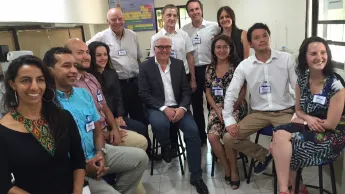DAAD’s Centers of Excellence for Research and Teaching: Four success stories
- 2015-06-26
- Bettina Mittelstraß
- Comment

Conducting top-class interdisciplinary research and training tomorrow’s scientists – it is this mission that links the four DAAD-funded Centers of Excellence in Chile, Colombia, Russia and Thailand across all national borders.
For five years they have been connecting hundreds of excellent international scientists with the German research community and providing top-notch training to young academics – the four Centers of Excellence for Research and Teaching in Chile, Colombia, Russia and Thailand. Since 2009, they have been supported by the DAAD with funding from the Federal Foreign Office. And because the work of all four has been so promising, they are receiving follow-up funding until 2019 to further develop their infrastructure.
“Research today requires close exchange with colleagues from different countries – familiarity with their work and their feedback guarantee high-quality research,” says Colombian scientist Juan Sebastián Celis. He’s keen to work where research can make a difference, and as a PhD student at the Center of Excellence in Marine Sciences (CEMarin) in Santa Marta, Colombia, he’s in exactly the right place. Scientists at CEMarin are addressing complex marine research problems – relating to climate change, for example – across national and disciplinary boundaries. Even Federal Foreign Minister Dr. Frank-Walter Steinmeier was able to see for himself, during a February visit to CEMarin in northern Colombia, just how much potential this work holds.
“Hardly a single scientific problem can be solved by one discipline alone”
Six Colombian universities, Justus Liebig University Giessen, the Colombian Ocean Commission and the Marine and Coastal Research Institute INVEMAR form the core of the research institutions cooperating at CEMarin. Besides conducting top-class research, there’s one thing they particularly care about: training tomorrow’s experts. Every year, as many as 14 young researchers are admitted to the Excellence Center’s PhD programme, where they receive training that optimally equips them for international cooperation – a good foundation for tackling problems of global interest.
Clever young minds also take centre stage at the German-Russian Interdisciplinary Science Center (G-RISC) in Saint Petersburg, which was set up by the Freie Universität Berlin and Saint Petersburg State University. Here, too, scientists are working on key climate research issues. For example, they are seeking to investigate the warming and interaction processes between layers of the atmosphere – in mixed teams comprising experts in mathematics, physics, geophysics and physical chemistry. Today, it’s important to equip students who have received excellent training in core scientific subjects in Russia and Germany with the skills they need to engage in interdisciplinary and international dialogue, believes Professor Eckart Rühl, G-RISC’s Scientific Coordinator at the FU Berlin. “The fact is, hardly a single major scientific problem can be tackled by one discipline alone.” Since 2009, G-RISC has enabled more than 1,500 young researchers – from bachelor’s to PhD students – to engage in exchange with fellow scientists.
“A special kind of research institution in Southeast Asia”
A different country, different priorities: researchers who are networked through the Thailand-based German-Southeast Asian Center of Excellence for Public Policy and Good Governance (CPG) are working to promote the rule of law. Located at Thammasat University in Bangkok, the CPG – which was set up in cooperation with German universities in Frankfurt am Main, Passau and Münster – focuses on the importance of democracy, the rule of law and human rights. “Over the past five years since the founding of the CPG, interest in justice as a research subject has grown considerably, so the Center of Excellence has become a special kind of research institution in Southeast Asia,” emphasises Thai legal expert and former diplomat Dr. Warawit Kanithasen. He supervises the work of the CPG, which has both regional and global reach, in his capacity as Senior Research Fellow. “Law is an applied discipline,” says Henning Glaser, initiator and Director of the CPG and for the past seven years a member of Thammasat University’s Faculty of Law. That’s why the CPG works together with all institutions of relevance to legal experts: government ministries, the courts and the police. It has long since made a name for itself as an excellent point of contact on legal issues, both within Thailand and for international organisations and diplomats in the region.
All four Centers of Excellence also pool their expertise to address problems specific to their respective locations. That’s why the Heidelberg Center for Latin America (HCLA), which was founded back in 2002 as a centre for postgraduate study and further training at Heidelberg University in cooperation with the Pontificia Universidad Católica and the Universidad de Chile in Santiago de Chile, is engaged in a wide range of teaching and research activities with an emphasis on exchange – in geo- and environmental sciences, for example. For Chilean sociologist Tomás Usón, who in 2014 successfully completed his master’s degree at the HCLA in the interdisciplinary programme Governance of Risks and Resources, the HCLA provides exactly the right skills. “Germany contributes a great deal of experience on environmental issues and the cooperation with the geographical institutes of the Chilean partner universities opens up new prospects for the region.”
In late April 2015, members of all four Centers of Excellence met at Giessen University in the framework of the symposium “Excellence through Networking – Centers of Excellence and Expertise as Examples of International Academic Cooperation” to discuss what has been achieved so far, where the opportunities and challenges lie – and to debate possible future scenarios.
Source
This article was orginally pubslihed in , issue 01/2015. The tells interesting stories from science, culture, Germany and the DAAD alumni network.
